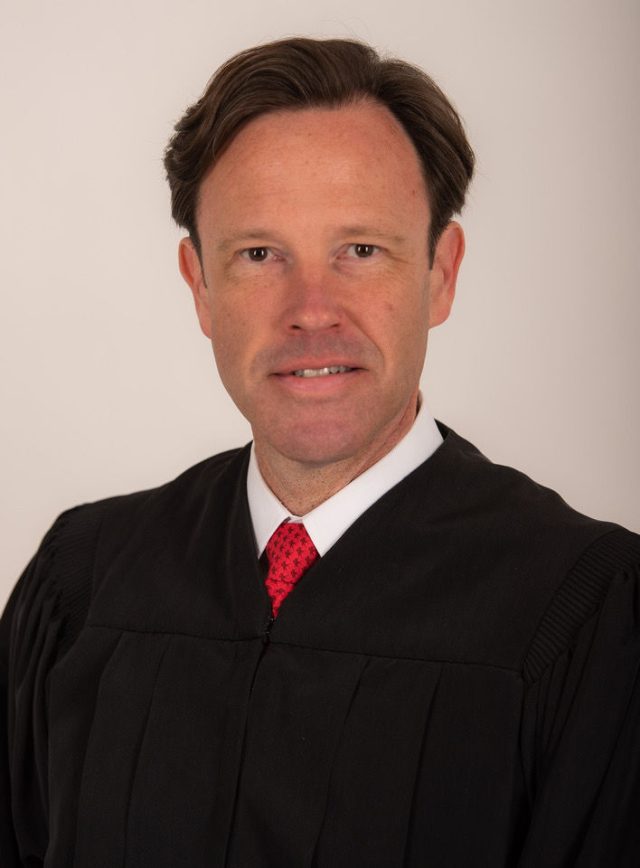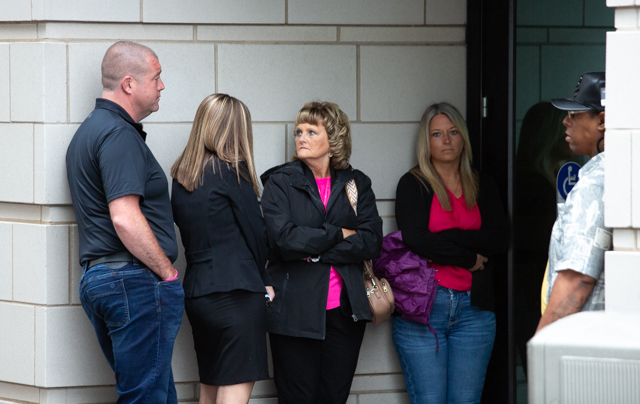The gay dilemma
Published 12:00 am Thursday, November 16, 2006
BOSTON – I suppose it’s hard to count Ted Haggard as a direct casualty of the 2006 election since his name wasn’t on any ballot. But if the evangelist had not been a prime supporter of a Colorado amendment banning gay marriage, Mike Jones might never have seen him on TV and said, “Oh my God, it’s Art.” The gay prostitute might never have outed the minister of the New Life Church as a customer of rentaboy or a referral for methamphetamine.
So the Sunday before the election, Pastor Ted resigned, labeling himself a “deceiver and a liar.” He no longer heads the National Association of Evangelicals, nor does he field calls from the president.
He’s embarked on religious rehab, more properly known as “spiritual restoration,” an odd name that seems to combine New Age steps and fundamentalist beliefs.
Still, what strikes me in the aftermath is not just the hypocrisy of Pastor Ted. I keep flashing back onto this sentence in his confession: “There is part of my life that is so repulsive and dark that I’ve been warring against it all of my adult life.” Haggard was not referring to marital infidelity or drugs, but to his gayness.
Haggard seemed like a kinder, gentler and greener evangelical than many on the religious right. Yet he once equated Gay Pride Day with Murderer’s Pride Day and looked to the Bible for the last word in science as well as religion. This was not just a man split between his walk and his talk. This was a man repulsed by himself.
How do we think about this repulsion? In the aftermath of his revelation, reactions were as bifurcated as our culture. Sympathy came in two varieties.
On the one hand there were congregants, fellow ministers and letters-to-the-editor writers who heard a man wrestling with real demons. Their sympathy was for a sinner.
On the other hand there were people who heard a man wounded by the culture of demonization. Their sympathy was for a man primed for repression and deception by the teaching of homosexuality as a sin.
We’ve heard echoes of this duality before. When “Brokeback Mountain” was presented as the ultimate gay cowboy story, the religious right found its own moral message in the movie: Look at the damage done by the evil of homosexuality. But other moviegoers saw the culprit of the tragedy in the repressive atmosphere that hung over these two men and the landscape.
Haggard’s deception and repulsion are, in some ways, lagging indicators of changing attitudes and science. Thirty years ago, only 13 percent of Americans thought homosexuality was inborn while 56 percent thought it came from the way people were raised. This year, for the first time, more Americans believe that homosexuality is inborn (42 percent) than due to upbringing (37 percent). More gays, more friends, families, co-workers have come to believe that gayness is not a choice, let alone a sin.
Nevertheless, this week Catholic bishops meeting in Baltimore offered guidelines for ministering to gays that might have been – indeed were – from the distant past. The tone, said one bishop, was meant to be “positive, pastoral and welcoming” to gay Catholics. But the message was that “homosexual inclinations” are “disordered,” that gays should live in chastity, and that they are banned from marrying or adopting. In short, gays are welcome with open arms into the church as long as they declare themselves sinners and reject – repel? – their own sexuality.
Writing for the conservative National Review, David Frum compared Haggard with Jones, the one who outed him. Surely, Frum wrote, Haggard was the more moral of the two for fighting his impulses, raising a family and a church. But are those the two choices? The gay prostitute and the gay closeteer? Aren’t they the flip side of the same coin?
In many places we are witnessing another way out of the repulsion – the creation of open homosexual unions, the establishment of gay families with all their ordinary, imperfect, daily struggles. We are watching the incremental acceptance of same-sex benefits and civil unions, and, at least in Massachusetts, gay marriage.
I suspect that Haggard’s idea of “spiritual restoration” is the restoration of the closet. “From time to time,” he wrote, “the dirt that I thought was gone would resurface.” If anything he seems to want more tools to fight the “dirt.” This charismatic man may well reappear, “cured,” as a poster boy for the ex-gay movement enlisted to preach “hope” for the homosexual.
But those whose families and workplaces and neighborhoods include openly gay men and women will always see this lost soul as a poster boy for the real damage caused by the old-time ministry of self-hate.
Democrats should consult with Republicans on Iraq
By TRUDY RUBIN
Now that the Democrats have a chance to influence Iraq policy, they ought to reflect on Benjamin Franklin’s warning to the signers of the Declaration of Independence.
“We must all hang together or assuredly we shall all hang separately,” Franklin said, referring to the dangers ahead in confronting Great Britain. That aphorism applies equally well to the situation facing Congress and the White House as they confront the situation in Iraq.
Let there be no mistake. The responsibility for Iraq’s disintegration and ugly violence lies squarely with the Bush White House. The administration’s lack of strategy and planning – and its postwar incompetence – led directly to the present Iraq chaos. Republican leadership – with its fierce partisanship that permitted no input from ideological outsiders – produced this disaster. The repercussions of this mess – which have emboldened radical religious forces throughout the Mideast – will haunt Americans for decades.
Having been treated with disdain for six years, Democrats will be tempted to respond in kind. Already, leading Democrats, like Michigan’s Carl Levin – who will become chairman of the Senate Armed Service Committee – are pushing for a “phased redeployment” of U.S. troops from Iraq in the very near future. “Phased redeployment,” a phrase heard much in the congressional campaign, will supposedly be a top Democratic priority come January. The White House, of course, rejects the idea.
But the election campaign is over, and it’s time for the Democrats to think about the bigger picture. Instead of pushing campaign themes, they should pause and consider whether a bipartisan strategy holds a better chance of avoiding the onrushing Iraq disaster we face.
I realize that bipartisanship provides no magic solutions. But neither does phased redeployment. Now that they have a congressional voice, the Democrats can’t afford to indulge in the kind of wishful thinking that hypnotized Republicans into endless policy mistakes. The time for illusions about Iraq – by Democrats or Republicans – has long gone.
Levin says that phased redeployment would force Iraqi leaders to compromise and end their sectarian battles. “We cannot save the Iraqis from themselves,” he adds; they are going to have to solve their own problems.
And what if they don’t? The ugly truth is that Iraq’s government is wholly dysfunctional. Its Shiite prime minister, Nouri al-Maliki, is incapable of reigning in Shiite militias, and its minority of Sunni cabinet ministers has no control over hard-line Sunni insurgents.
If U.S. troops start a phased redeployment that doesn’t take into consideration these unpleasant facts, Iraq’s civil war will go into overdrive. American troops will be caught in the middle as they exit.
The hard-hearted might conclude that Americans should just let Iraqis have at it, and then deal with the civil war’s victors. But – if Americans just pull out, without any preparation for the aftermath – the Iraqi civil war will last for years and drag in Iraq’s neighbors.
What is Sen. Levin’s Plan B for when Sunni provinces fall under control of the most vicious Iraqi insurgents – the hard-line Baathists and religious fanatics, who will train terrorists eager to overthrow moderate Arab regimes in the region? If U.S. troops relocate to bases in the Gulf, and Sunni areas become another Taliban-land, will Democrats endorse the return of large numbers of troops to retake Anbar Province? How should America cope with the momentum a quick U.S. withdrawal will give to radical Islamic Arab groups that want to do America harm?
Before rushing to endorse phased withdrawal, wouldn’t it make sense for Democrats to put withdrawal in broader context? Wouldn’t it be wiser to give some more thought to the impact on the entire Mideast region, including our tense relations with Iran?
Wouldn’t it be smarter to wait for the much-anticipated report of the bipartisan Baker Study Group on Iraq, due in December. After all, this group, unlike the Bush White House, has listened to ideas from all sides.
No doubt the temptation to jump the gun and call for quick withdrawal is enticing, especially since the White House has no viable Iraq policy and voters have asked for change. Yet the long-term consequences of complete Iraqi collapse would be so awful that Democrats need to think beyond the results of the elections and beyond the pressure from their base. We will all pay the price for total Iraq failure no matter who’s to blame.
Before leaping to endorse positions they may regret, Democrats should step back, consult with one another and with thoughtful Republicans. They should consider Iraq realities free from ideological blinders.
The Bush team deluded itself about the likely repercussions of its Iraq policy – but that doesn’t mean Democrats can afford to do likewise. Not now.






